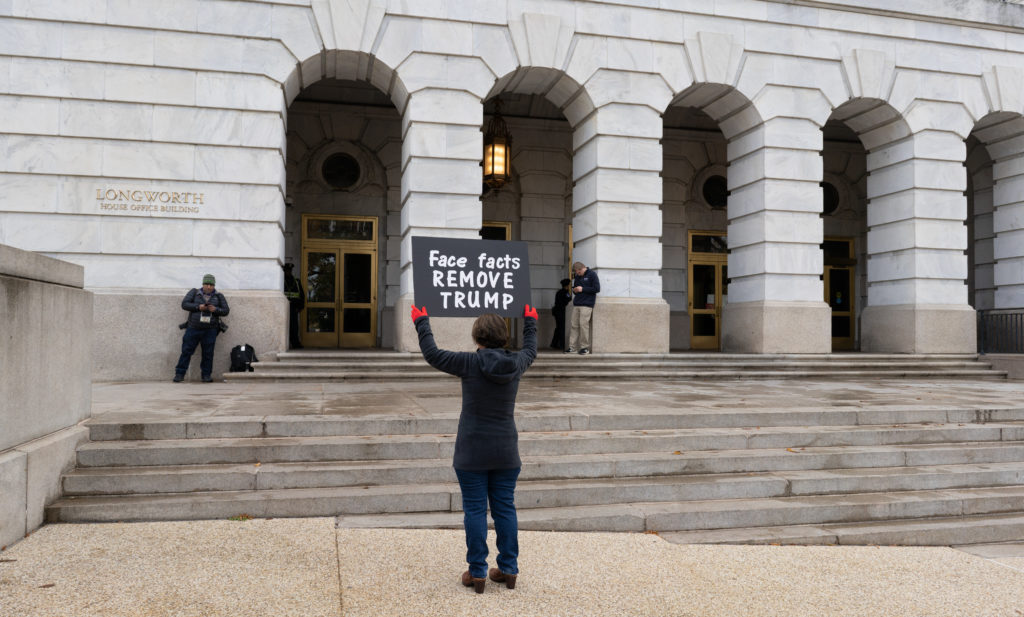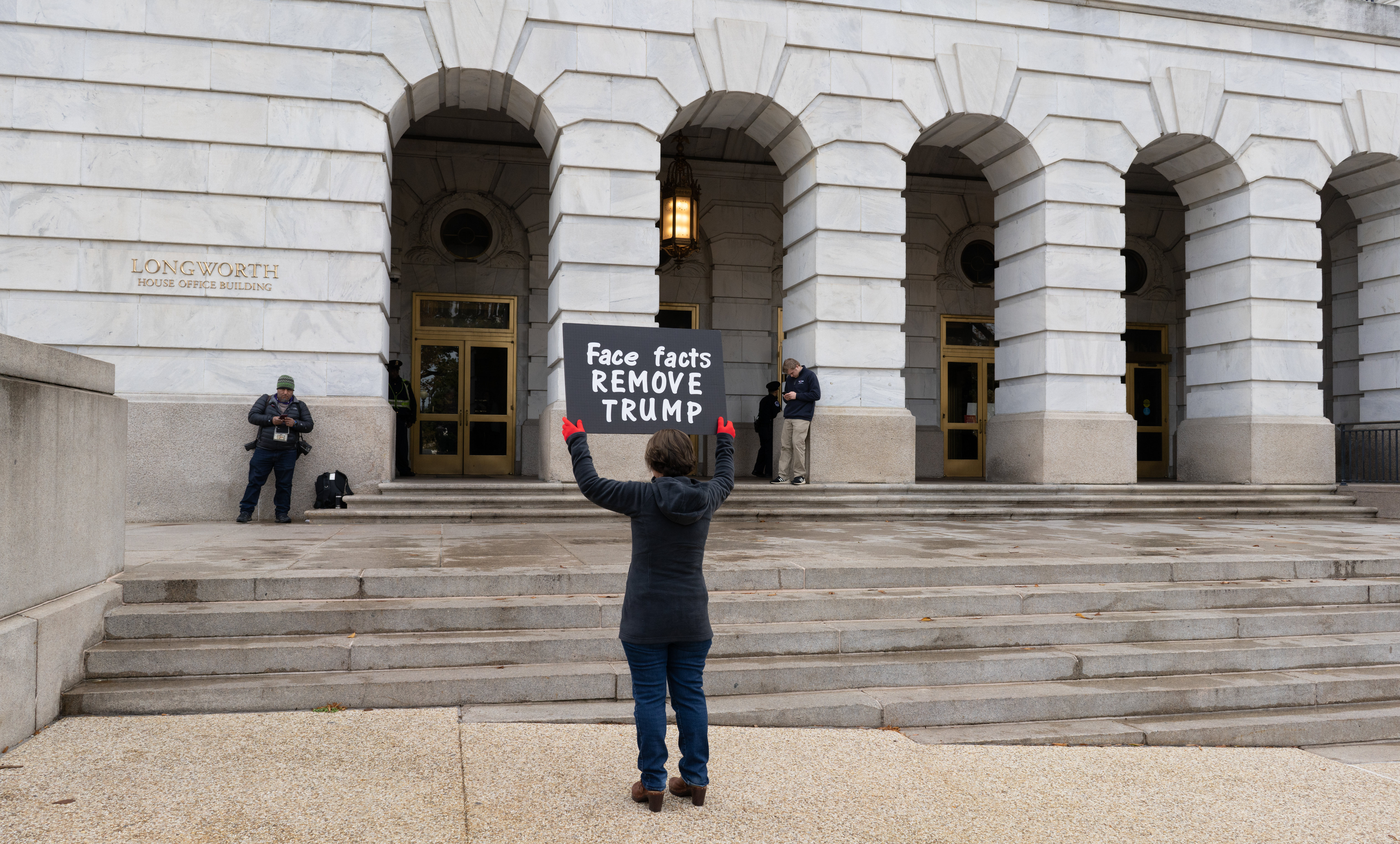On the Senate floor as the impeachment trial rushed to an end, Sen. Rand Paul, R-Ky.,handed a message to Chief Justice John Roberts asking him to expose the whistleblower who objected to President Trump’s phone call to Ukraine President Volodymyr Zelensky.
Roberts refused to name the whistleblower.
The next day, Paul read the name aloud for himself.
A simple Google search is all that’s necessary to find the name of the Ukranian whistleblower. Harassment and recrimination already are a part of Trump’s reprisal. After Trump was impeached by the House and then acquitted by the Senate, Lt. Col. Alexander Vindman – who publicly blew the whistle after being called to testify – was fired from the White House National Security Council.
None of this is new. The relationship between whistleblower, journalist and authority is an old one that traditionally ends badly for the whistleblower.
“When the Ukranian phone call whistleblower came forward, you knew it would end badly for him,” whistleblower Jeffrey Sterling said last month. “When that individual came forward, the first people to be informed were the White House and the Attorney General’s office. The very subjects of his complaint were given a heads up that he said they were potentially involved in wrongdoing.”
Sterling -who grew up in Missouri’s bootheel and attended Washington University Law School before joining the CIA – knows what he’s talking about when it comes to the consequences of blowing the whistle. He went to prison.

In the early 2000s Sterling talked with both the House and Senate Intelligence Committees about his problems with the Central Intelligence Agency. He spoke to the House Intelligence Committee about his racial discrimination suit with the agency. He spoke to the Senate about Operation Merlin, a CIA plot to place flawed nuclear plans in Iran’s hands. The flaws were easy to spot and helped Iran’s plans instead of hindering them.
Operation Merlin became public in James Risen’s book “State of War.” The chapter in the book embarrassed the CIA. The government wanted the whistleblower and settled on Sterling as the culprit. The government indicted Sterling for espionage and arrested him in O’Fallon, Mo. He was convicted and sent to prison for three and a half years.
To this day, Sterling maintains that he was not the source. Risen never divulged his sources despite losing an appellate court decision compelling him to testify.
Sterling was convicted based on phone records and other circumstantial evidence. He was released in 2018 and on Jan. 28 was at Millikin University, from where he graduated, to talk about his decade-long ordeal.
“I love that whistleblowing has been brought to the forefront but it’s also showing some of the faults,” Sterling said. “They’re identifying the whistleblower. What would that do? Identifying the whistleblower does nothing but open that individual to inappropriate retaliation, reprisal and harassment.”
Sterling lived through over a decade of harassment before his case finally came to trial. Today, a free man, he defends the cause of the whistleblower.
“No one wakes up one morning and says ‘Hey, I’m going to be a whistleblower,’” Sterling said. “It takes a certain type of person to come forward, knowing there’s going to be a big risk. Whistleblowers are people just like everyone else and they love and have concerns about their country. And they’re taking a step to protect their country in the face of tremendous risks.”
The biggest issue Sterling sees is the concentration on who the whistleblower is instead of the issue the whistleblower is exposing.
“The media tends to focus on the whistleblower instead of the issue,” he said. “Edward Snowden, Reality Winner, John Kiriakou all have blown the whistle and most have gone to prison or exile. But look at what they exposed.”
Winner provided information connecting the Trump campaign to Russia, Kiriakou blew the whistle on torture in Guantanamo and Snowden exposed the NSA’s massive data collection of people’s phone and online information.. Winner is currently serving five years in prison, Kiriakou pled guilty to exposing a CIA asset and served 30 months in prison. Snowden is in exile in Russia.
“They changed things,” Sterling said. “Look at the changes that happened because of Snowden. But the focus is only on him and what he did. What about the utility of what he did?”
The whistleblower in the Ukraine case is different from Sterling and the others he cites. He followed the whistleblower laws that set up procedures for anonymous complaints and provide protections. Many famous whistleblowers in recent history – Chelsea Manning, Sterling, Winner and Snowden – did not have legal whistleblower protections.
While the media have steadfastly refused to name the Ukranian whistleblower in print, their record is not a good one when it comes to protecting sources.
Reality Winner sent a message to The Intercept exposing a campaign connection to Russia. While checking out its validity, the Intercept exposed Winner to authorities. “I so can’t stand the Intercept,” Kiriakou said in a 2018 interview. “I sort of actively campaign against them.
Jeffrey Sterling discusses his time working for the CIA (Video by Jamey Witmer Lambert)
Kiriakou is still the only person to serve jail time over the U.S. torture program at Guantanamo. A former CIA agent and journalist, Kiriakou is now a radio host who concentrates often on government overreach.
“It’s not the life I envisioned but it’s comfortable,” Kiriakou said. “Financially, I’m OK. I have five kids. As crazy as it sounds things turned out OK.”
Sterling is still trying to come to terms with a new life, one without the government shadowing his every move. But he was left with a mistrust of reporters.
More than anyone, Sterling can talk about the balance between whistleblower, journalist and authority. After all, for three years, Sterling’s case was an afterthought as the government tried to compel Risen, now a reporter for The Intercept, into testifying against him.
“James Risen wrote something that they used to implicate me as being the source,” Sterling said. “What responsibility do journalists have to protect a source or someone being accused of being a source?
“I think that’s a very difficult question for journalism to answer. There is a responsibility for journalists to get the information out there. But if you have a relationship with someone that you got that information from, there should be some level of protection. I think journalists, I mean the entire industry, they have to review that themselves and where they stand with that and they have to come to an understanding what they need to do.”
Sterling had a relationship with Risen. Risen wrote about his racial discrimination case against the CIA.
“With my case, even though I didn’t give any information to James Risen, I had a relationship with him,” Sterling said. “That relationship wasn’t the crux of what I went on trial for. The journalists world rallied around him when there was a threat of him going to prison or him being forced to testify, they rallied around him. Once he was out of danger, there was absolutely no interest.”
Jeffrey Sterling discusses his time working for the CIA on 89.5 WJMU (Video by Jamey Witmer Lambert)
Once Risen was free from the trial, journalists were noticeably absent from the Sterling trial. Only blogger Marcy Wheeler and the Nation’s Norman Solomon were at every day of the trial. The press just assumed Sterling’s guilt.
“That was a bad example about journalists,” Sterling said. “Once Risen was gone, they were gone. They only gave a damn about themselves.”
Sterling understands that Risen was in a difficult position. Even if the source wasn’t Sterling, he could not testify and be forced to surrender his source.
“I know Risen a little,” Kiriakou said. “You have to respect what the guy did. He can’t talk. He couldn’t talk. On a personal level I wish he just could have blurted it out.”
Sterling also understands.
“I can’t express the ethical side for him, I don’t know what he went through,” he said. “I do know that during the period of time when the government was going after him, I became a spectator at my own trial. It was no longer the United States of America vs. Jeffrey Sterling, it was the United States of America vs. James Risen.
“But I don’t think he could have done anything different.”
Sterling believes that even if Risen said he wasn’t the source, it wouldn’t have mattered.
“I always felt like I don’t give a damn what he would say, I didn’t do it,” Sterling said. “It didn’t matter whether he spoke on behalf of me or not. They were still coming after me. And then that would have put his integrity into question because they would have followed that with who did then. He would have been asked to give up everybody he’d ever talked to.”
But Sterling does understand that whistleblowers are in danger and with every instance of a journalist outing them or of government reprisal, the odds of more whistleblowers coming forth dwindle. And he believes that journalism, as a whole, must come to an understanding of their role in the whistleblower, journalist, authority triangle.
“What is the role of the journalist,” Sterling said. “Will he come to the aid of a source, or will he stay silent? It’s a very deep question. I hope it’s one that they discuss more.”
Scott Lambert is an associate professor of English/Journalism at Millikin University in Decatur, Illinois.
